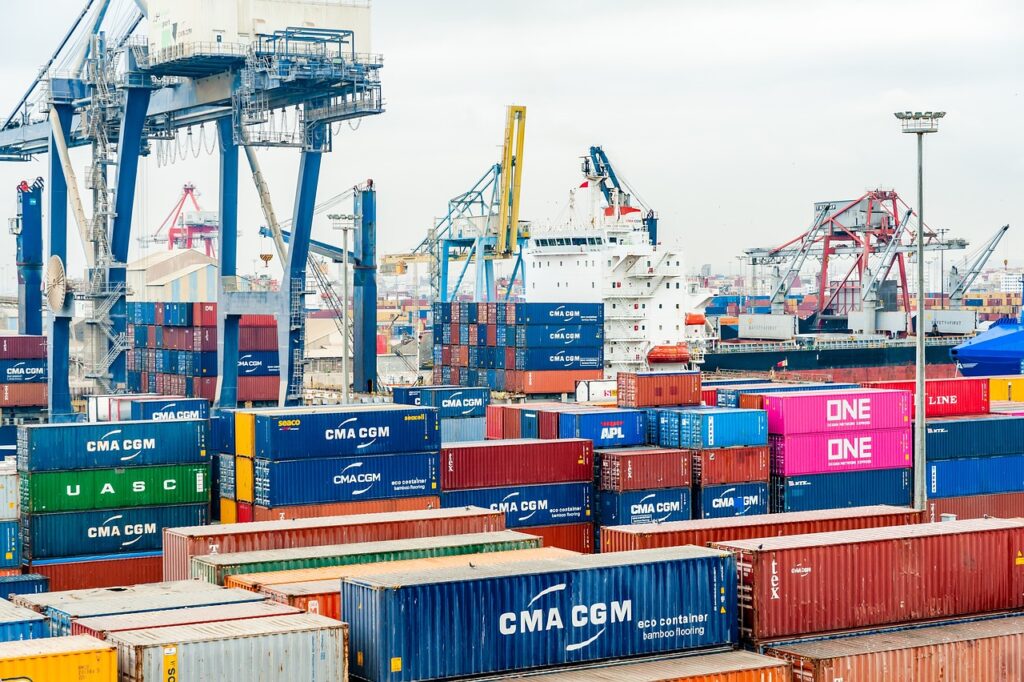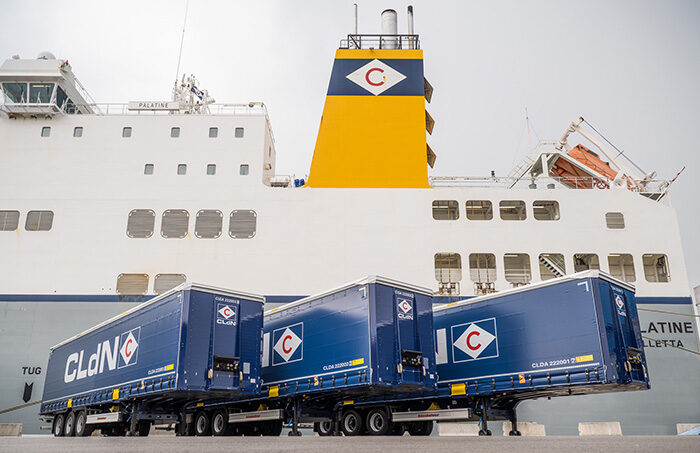Adaption's Integrations
Discover all integrations of Adaption: Transform your logistics proces
In the world of logistics, everything revolves around efficiency and control. For companies dealing with complex supply chains, it is essential that all systems work together seamlessly. Adaption addresses this with a range of powerful integrations.
Adaption's Integrations
In this blog, you’ll discover how our integrations are designed to help businesses optimize and streamline their logistics and financial processes.
Integrations for warehousing
Adaption’s Standard API
What is the Standard API?
Efficiency is crucial in the logistics sector. Quickly and accurately processing data such as inbound and outbound orders can make a significant difference in the daily operations of a warehouse. At Adaption, we understand this better than anyone and have developed powerful integration capabilities to automate and streamline these processes: the Standard API.
What does the Standard API integration mean for Adaption's software?
The Adaption Standard API is a flexible tool that allows our WMS software to be easily integrated with other systems, such as ERPs, TMSs, or the systems of customers and suppliers. The benefits of the Standard API integration:
View suborders and dossier data.
With the Standard API integration, you gain real-time insight into suborders and dossier data, ensuring you are always informed about the status of your logistics processes. This integration provides detailed and up-to-date information, enabling you to act quickly, plan more efficiently, and respond better to changes.
Synchronize relationship information.
With the Adaption Standard API, synchronizing relationship information, such as customer and supplier data, becomes simple and efficient. By seamlessly connecting systems, changes to relationship data are automatically updated across all linked applications. This prevents duplicate entries, minimizes errors, and ensures that everyone always works with up-to-date information.
Create and manage inbound and outbound orders.
The Adaption Standard API enables fast and error-free management of inbound and outbound orders. Orders are automatically imported from connected systems, such as ERPs, eliminating the need for manual entry and preventing errors. Real-time order management provides immediate insight into statuses and changes, ensuring you remain in control at all times. ERP systems that can be integrated for order import include:
Thanks to the API, companies can create a fully automated supply chain where data is seamlessly exchanged between systems. This not only saves time but also prevents errors caused by manual input.
CSV upload
In addition to the API, Adaption offers a user-friendly CSV upload functionality. This is designed for companies that prefer to upload their data via a file. With just a few clicks, users can upload a CSV file to:
Create inbound dossiers, outbound dossiers, and transport orders.
Directly add orders and other relevant data to the system.
The CSV upload is ideal for companies that want to consolidate order data from multiple sources into a clear file, which can then be directly processed in the WMS.
With the Standard API and CSV upload, Adaption provides a future-proof solution for logistics companies striving for greater control, less manual work, and a fully integrated supply chain.
Integrations for transport
Webfleet (TomTom)
Who is Webfleet?
What does the integration with Webfleet mean for Adaption's software?
The integration with Webfleet provides a significant enhancement to Adaption’s software in fleet management and transport optimization.
The benefits of the Webfleet integration:
Seamless synchronization between Webfleet and Adaption:
With the integration between Webfleet and Adaption, vehicle data is automatically and seamlessly synchronized between both systems. This means that all relevant information, such as locations, driving times, and status updates, is immediately available within the Adaption software. As a result, planners always have access to up-to-date data, which is crucial for effective transport management.

Quick response to changes:
Thanks to this integration, planners can respond more quickly to changes in the schedule, such as delays caused by traffic congestion, unexpected jams, or alterations in delivery schedules. They can make adjustments immediately and provide drivers with new instructions, saving valuable time and ensuring smoother deliveries.
Efficient fleet management through automatic synchronization:
Moreover, the integration significantly streamlines the management of logistics operations. Automatic synchronization eliminates the need for manual data entry, reducing errors and enhancing efficiency. This not only lowers operational costs but also increases the speed and accuracy with which companies can manage their fleet.
The combination of real-time data and intelligent automation enables companies to operate faster and smarter. They can respond more effectively to unexpected situations, plan more efficient routes, and optimize their transport processes. Ultimately, this results in greater control, higher customer satisfaction, and significant cost savings.
AddSecure (Astrata)
Who is AddSecure?
AddSecure, formerly known as Astrata, is a technology company specializing in advanced telematics and software solutions for fleet management and logistics operations. The company provides services such as vehicle tracking, supply chain management, and driver and freight management solutions, aiming to improve the efficiency and safety of transport activities. In June 2024, Astrata was acquired by AddSecure, a European provider of secure IoT connectivity and end-to-end solutions. Following this acquisition, Astrata Europe B.V. now operates under the name and brand AddSecure.
What does the integration with AddSecure mean for Adaption's software?
The integration of AddSecure with Adaption’s software offers significant benefits for companies aiming to optimize transport and logistics processes. This connection ensures seamless integration of key data and communication between drivers and the back-office team, resulting in more efficient operations and improved decision-making. The benefits of the AddSecure integration:

Direct communication and task processing with drivers:
With the integration, drivers can directly input transport data and documents, such as delivery notes, waybills, and status updates, from their mobile devices. This data is synchronized with Adaption in real time, ensuring planners always have access to up-to-date information. This minimizes errors, shortens response times, and enhances transparency in the supply chain.
Efficiency and control:
Adaption users can send transport orders directly to drivers or hired charters through the Astrata integration. This streamlines communication and ensures tasks are executed quickly and without misunderstandings. Additionally, changes to orders can be communicated instantly, offering flexibility in the face of unexpected planning changes.
The integration with AddSecure enhances efficiency, communication, and control over transport processes. Through real-time data exchange and automated task processing, companies can respond more quickly to changes, reduce operational costs, and improve overall customer satisfaction. This connection makes Adaption’s software even more powerful and better suited to modern logistical challenges.
Integrations for multimodal transport
Portbase
Who is Portbase?
Portbase is an organization that operates as the execution body for the port authorities of Rotterdam and Amsterdam. The company focuses on digitally connecting the port community to ensure that goods and data flows through the Dutch ports and associated logistics chains are as efficient, sustainable, and secure as possible.
What does the integration with Portbase mean for Adaption's software?
By integrating Portbase into Adaption’s logistics software solutions, users can benefit from a streamlined process for pre-notifying container visits. This leads to more efficient planning and execution of transport activities. The benefits of the Portbase integration:
Automated pre-notifications:
Users can send pre-notifications to terminals and depots directly from the Adaption software, reducing manual input and minimizing the risk of errors.
Real-time statusupdates:
The integration ensures automatic feedback on container statuses, allowing planners to respond promptly to changes and minimize delays.

More efficient planning:
By providing insight into available time slots and current container statuses, transport can be better planned, leading to higher resource utilization and lower operational costs.
Improved communication:
The seamless data exchange between Adaption’s software and HCN facilitates better collaboration among all parties involved in the logistics chain.
In short, the integration of Portbase into Adaption’s software enhances control over logistics processes, increases efficiency, and contributes to a smoother and more reliable supply chain.
CLdN
Who is CLdN?
CLdN is a logistics service provider specialized in integrated quay-to-quay and door-to-door solutions. With a fleet of more than 30 RoRo vessels and 200 weekly sailings, CLdN connects key economic regions in Europe. The company offers shortsea transport, multimodal solutions, and operates terminals in Belgium, the Netherlands, and the United Kingdom.
What does the integration with CLdN mean for Adaption's software?
The connection between Adaption’s SaaS solution and the CLdN Interface ensures that all relevant transport information is available in real-time within Adaption’s cloud environment. The benefits of the CLdN integration:
Automated processes and reduced margin of error:
Many processes, such as order entry, tracking, and document management, are automated. This significantly reduces the margin of error and ensures that information does not need to be manually entered twice in both systems. This leads to time savings and more efficient operations.
Improved multimodal solutions:
With the integration, it becomes possible to effortlessly switch between different transport methods within one central system. Whether it’s road transport, sea freight, air freight, or a combination of these, everything can be easily managed and adjusted from the same environment.

Seamless integration of seaport terminals:
Users have easy access to services such as storage, transshipment, and other terminal processes directly from the software environment. This saves time and resources by streamlining interactions with terminals and improving the efficiency of sea transport.
Container and customs information exchange:
The integration ensures that container information and customs details are automatically shared between both systems, simplifying compliance and ensuring fast flow of goods.
Our SaaS solution offers more than just data exchange: it provides a powerful platform to streamline, enhance, and manage your entire logistics processes. Whether you are working with road, sea, or multimodal transport, this integration enables you to operate faster and more effectively.
Hupac
Who is Hupac?
Hupac is a Swiss logistics service provider specialized in combined freight transport by rail, with a focus on intermodal transport (trucks, trailers, containers). The company, founded in 1967, connects key economic regions in Europe and promotes environmentally friendly modal shifts from road to rail transport. They handle approximately one million shipments annually and have a strong focus on innovation and sustainability.
What does the integration with Hupac mean for Adaption's software?
The integration with Hupac adds powerful functionality to Adaption’s software by automating rail order processes. The benefits of the Hupac integration include:
Efficiency in rail transport through automation:
Thanks to this integration, rail orders can be sent directly from Adaption’s software to Hupac’s system, without the need for manual steps. This fully automates the process, saving time for logistics service providers and transport companies, while preventing errors caused by manual input.

Real-time insight and sustainability:
Additionally, the integration ensures real-time communication with Hupac, so users are always informed about the status of their rail shipments. This makes planning and managing intermodal transport easier and more organized. The user-friendliness and efficiency of this connection make rail transport not only more accessible but also more attractive as a sustainable transport option.
With this integration, Adaption reaffirms its commitment to supporting companies with innovative solutions that meet their logistical needs. It not only provides technical benefits but also helps accelerate the transition to greener transport methods.
Integrations for administration
Revolut
Who is Revolut?
Revolut is a tech company that offers an all-in-one financial app. With Revolut, users can bank, make payments, exchange currencies, and manage their spending globally, all through one platform. Revolut is known for its innovative approach to digital banking and aims to break traditional financial boundaries by providing flexible and accessible financial services.
What does the integration with Revolut mean for Adaption's software?
The integration with Revolut brings a major improvement in payment and invoicing management within Adaption’s software. Thanks to this integration, users can generate invoices that directly create payment obligations, ensuring more efficient processing. The benefits of the Revolut integration include:

Automatic payment processing:
One of the key benefits is the ability to automatically process payments through Revolut, eliminating the need for manual input. After each payment, payment statuses are automatically updated in Adaption, and supplier data is synchronized between both systems. This results in a streamlined payment process, minimizes errors, and saves time through seamless data reconciliation. This integration provides users with more control and convenience when managing financial transactions.
AFAS Software
Who is AFAS Software?
AFAS Software is a Dutch family-owned company that develops modern business software to automate various business processes across different sectors. Founded in 1996, AFAS specializes in integrated solutions that include HRM, payroll, financial administration, and logistics processes. With a strong focus on innovation and customer orientation, AFAS aims to help businesses work more efficiently by reducing administrative burdens and optimizing processes.
What does the integration with AFAS mean for Adaption's software?
The integration of AFAS Software with Adaption offers numerous benefits for companies looking to optimize their business processes. Through this integration, organizations can seamlessly align their logistics and administrative processes, leading to improved efficiency, accuracy, and overview. The benefits of the AFAS integration include:
Streamlined processes:
The integration ensures that logistical data, such as order information and invoices, are directly available in AFAS. This makes administrative processes, such as invoicing and accounting, faster and simpler.

Improved collaboration:
The connection between AFAS and Adaption facilitates better collaboration between departments, such as logistics and finance. This ensures greater transparency and a more efficient workflow.
Automatic data exchange:
Thanks to the integration, financial and logistical data are automatically synchronized between AFAS and Adaption. This eliminates manual input and significantly reduces the chance of errors.
The integration of AFAS Software with Adaption provides businesses with a powerful solution to optimize their business processes. It combines the best of logistics and financial software, allowing organizations to work more efficiently, save costs, and achieve better results.
Exact
Who is Exact?
Exact is a Dutch software company that has been offering innovative cloud solutions for SMEs and accountants since 1984. The company supports more than 675,000 customers worldwide with products for financial administration, ERP, and accounting. Exact serves various sectors, including manufacturing, trade, and business services, with solutions that automate and optimize business processes.
What does the integration with Exact mean for Adaption's software?
With the integration of Exact into Adaption’s software, data can be automatically synchronized, ensuring more efficient workflows, fewer manual tasks, and better control over financial transactions. The benefits of the Exact integration include:
Automatic processing of purchase invoices:
With the Exact integration, purchase invoices are automatically synchronized between Adaption and Exact. This means that invoices are processed directly from the logistics software in Exact, without the need for manual input.
Real-time insight into payments:
Thanks to the integration with Exact, payments and receipts can be retrieved directly from Exact and processed in Adaption. This provides users with real-time insight into the payment status of customers.

Efficient invoicing with sales invoices:
The connection with Exact makes it possible to automatically transfer sales invoices generated in Adaption to Exact. This streamlines the invoicing process, provides real-time insight into outstanding invoices, and ensures that the sales administration is always accurate.
Seamless management of relationships:
With this functionality, customer and supplier data can be easily synchronized between Adaption and Exact. New relationships created in Adaption are automatically added to Exact, and existing data can be easily retrieved.
The integration of Exact with Adaption offers users a powerful platform that seamlessly connects both logistical and financial processes, allowing companies to operate more efficiently and effectively.
Conclusion: the power of integration with Adaption.
Adaption’s integrations are the key to a more efficient and streamlined logistics operation. Whether it’s seamlessly exchanging data with ERP or TMS systems, automating complex multimodal transport processes, or providing real-time insights through advanced APIs—Adaption makes it possible. Our solutions offer not only practical benefits, such as time savings and error reduction, but also enhance collaboration between all links in the supply chain.
With the assurance of an up-to-date, secure cloud environment and innovative features like the CLDN interface and extensive CSV upload capabilities, Adaption proves itself time and again as the partner for businesses looking to excel in the logistics sector. By combining technology with flexibility and customer-focused support, we not only make integrations easier but also future-proof your entire logistics process.
Want to work more efficiently? Get in touch!
Would you like to work more efficiently, gain more insight, and save costs? Feel free to get in touch, our experts would be happy to explore the possibilities with you!








